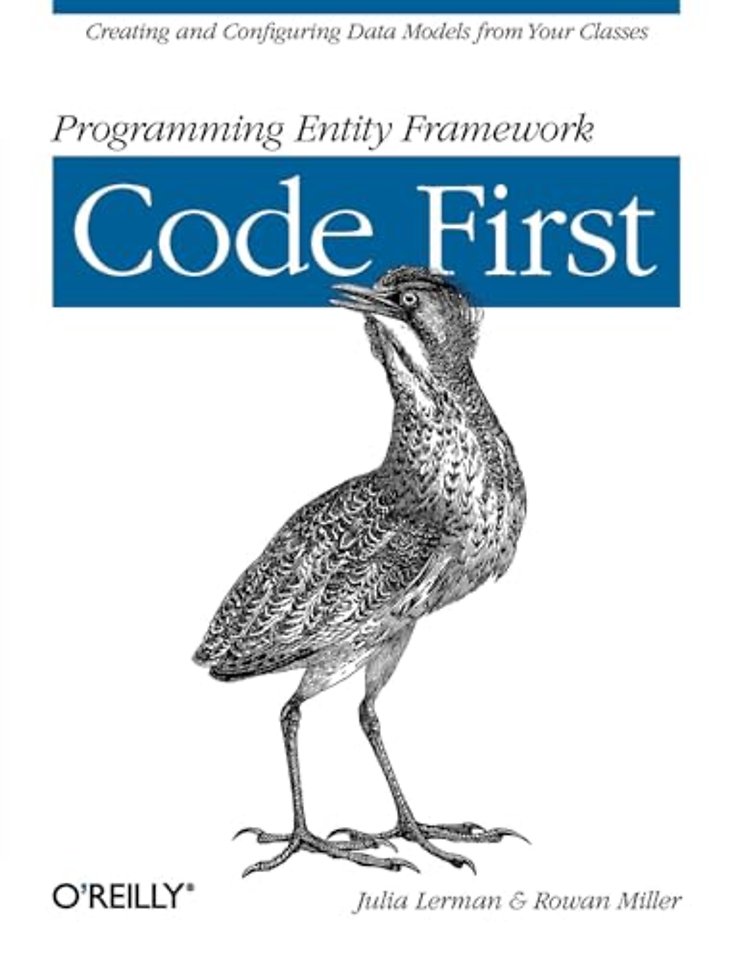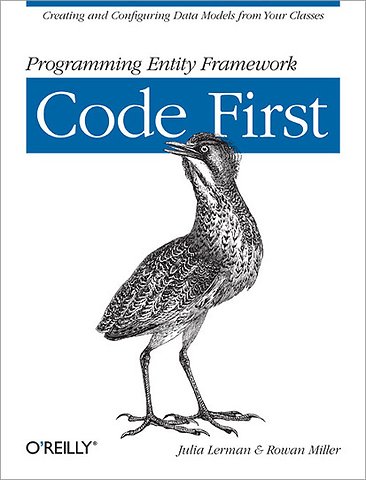


Julia Lerman is the leading independent authority on the Entity Framework and has been using and teaching the technology since its inception two years ago.
Meer over de auteursProgramming Entity Framework: Code First
Creating and Configuring Data Models From Your Classes
Samenvatting
Take advantage of the Code First data modeling approach in ADO.NET Entity Framework, and learn how to build and configure a model based on existing classes in your business domain. With this concise book, you'll work hands-on with examples to learn how Code First can create an in-memory model and database by default, and how you can exert more control over the model through further configuration.
Code First provides an alternative to the database first and model first approaches to the Entity Data Model. Learn the benefits of defining your model with code, whether you're working with an existing database or building one from scratch. If you work with Visual Studio and understand database management basics, this book is for you.
- Learn exactly what Code First does-and does not-enable you to do
- Understand how property attributes, relationships, and database mappings are inferred from your classes by Code First
- Use Data Annotations and the Fluent API to configure the Code First data model
- Perform advanced techniques, such as controlling the database schema and overriding the default model caching
Specificaties
Over Rowan Miller
Inhoudsopgave
1. Welcome to Code First
-Modeling with EF Before Code First
-Inception of Code First
-Getting Code First to Developers in Between .NET Releases
-Writing the Code…First
-Managing Objects with DbContext
-Using the Data Layer and Domain Classes
-Getting from Classes to a Database
-Working with Configuration
-Creating or Pointing to a Database
-What Code First Does Not Support
-Learning from This Book
2. Your First Look at Code First
-Introducing EF to the Domain Classes
-Putting the Pieces Together in an Example
-Overriding Convention with Configurations
-Understanding How Model Changes Impact Database Initialization
-Configuring Code First with the Fluent API
-Summary
3. Using Conventions and Configurations for Property Attributes
-Working with Property Attributes in Code First
-Mapping Keys
-Configuring Database-Generated Properties
-Configuring TimeStamp/RowVersion Fields for Optimistic Concurrency
-Configuring Non-Timestamp Fields for Concurrency
-Mapping to Non-Unicode Database Types
-Affecting the Precision and Scale of Decimals
-Working with Complex Types in Code First
-Configuring Properties of Complex Types
-Summary
4. Using Convention and Configuration for Relationships
-Working with Multiplicity
-Working with Foreign Keys
-Working with Inverse Navigation Properties
-Working with Cascade Delete
-Exploring Many-to-Many Relationships
-Working with Relationships that Have Unidirectional Navigation
-Working with One-to-One Relationships
-Summary
5. Using Conventions and Configurations for Database Mappings
-Mapping Class Name to Database Table and Schema Name
-Mapping Property Names to Database Columns
-Allowing Multiple Entities to Map to a Single Table: aka Table Splitting
-Mapping a Single Entity Across Multiple Tables
-Controlling Which Types Get Mapped to the Database
-Understanding Property Mapping and Accessibility
-Preventing Properties from Being Included in the Model
-Mapping Inheritance Hierarchies
-Working with Abstract Base Classes
-Mapping Relationships
-Summary
6. Controlling Database Location, Creation Process, and Seed Data
-Controlling the Database Location
-Working with Database Initialization
-Using Database Initializers to Seed Data
-Using Database Initialization to Further Affect Database Schema
-Summary
7. Advanced Concepts
-Mapping to Nontable Database Objects
-Removing Conventions
-Taking Control of Model Caching
-Working with the EdmMetadata Table
-Using Code First with ObjectContext
-Summary
8. What's Coming Next for Code First
-Code First Migrations
-Entity Framework Power Tools
Anderen die dit boek kochten, kochten ook
Net verschenen
Rubrieken
- aanbestedingsrecht
- aansprakelijkheids- en verzekeringsrecht
- accountancy
- algemeen juridisch
- arbeidsrecht
- bank- en effectenrecht
- bestuursrecht
- bouwrecht
- burgerlijk recht en procesrecht
- europees-internationaal recht
- fiscaal recht
- gezondheidsrecht
- insolventierecht
- intellectuele eigendom en ict-recht
- management
- mens en maatschappij
- milieu- en omgevingsrecht
- notarieel recht
- ondernemingsrecht
- pensioenrecht
- personen- en familierecht
- sociale zekerheidsrecht
- staatsrecht
- strafrecht en criminologie
- vastgoed- en huurrecht
- vreemdelingenrecht





